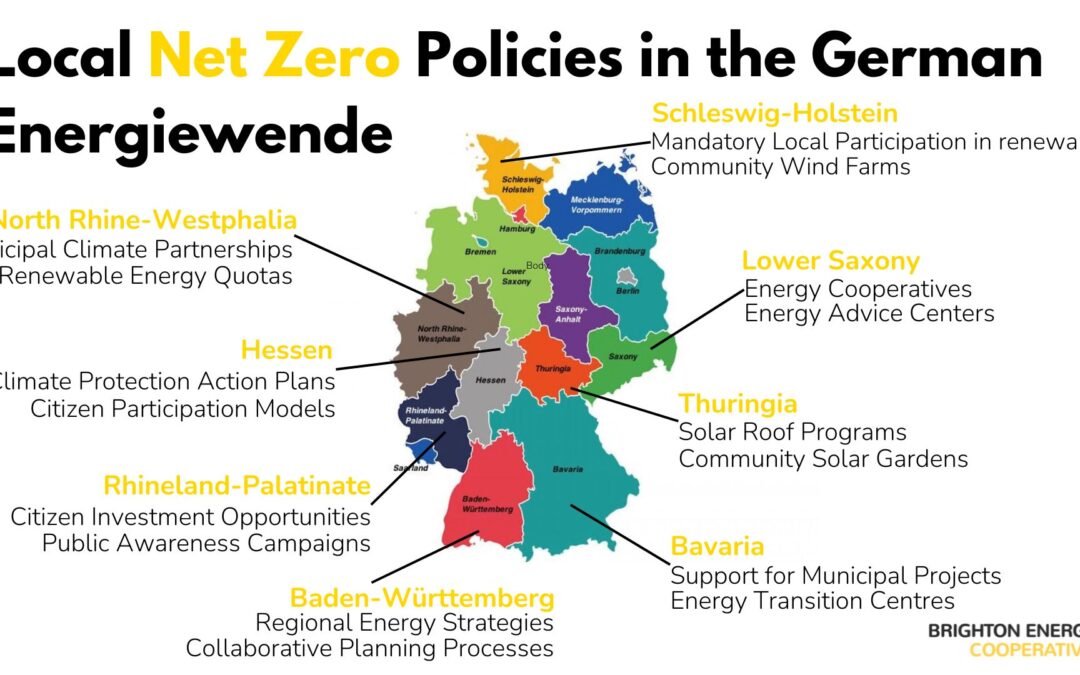There has been much talk lately of how local authorities and community groups could work together to tackle the collective challenge of Net Zero.
But how is this actually going to work? Germany and Denmark are often cited here as examples of best practice, as mentioned on p17 of this Labour paper. But the research cited is not exactly illuminating.
So how did the Germans do it?
Below is a list of specific policies that municipalities in Germany have used to bring about the spectalar success of the Energiewende (Energy Transition).
Might these be of use in the UK?
1. Schleswig-Holstein’s Wind Energy Participation Model
Mandatory Local Participation: This policy requires wind energy developers to offer a certain percentage of shares to local residents and municipalities. It ensures that the economic benefits of wind energy projects are shared with the local community, fostering acceptance and support.
Community Wind Farms: Numerous community-owned wind farms have been developed under this model, with local residents and municipalities holding significant stakes.
2. Thuringia’s Renewable Energy Support Program
Energy Cooperatives: Thuringia supports the formation of energy cooperatives through grants and advisory services. These cooperatives can invest in various renewable energy projects, such as solar, wind, and bioenergy.
Energy Advice Centers: The state has established regional energy advice centers that provide technical and financial guidance to community groups and local authorities interested in developing renewable energy projects.
3. North Rhine-Westphalia’s Climate Protection Plan
Municipal Climate Partnerships: Encourages partnerships between municipalities to develop joint renewable energy projects. This includes shared investment in larger projects that might be beyond the capacity of a single municipality.
Renewable Energy Quotas: Municipalities are given renewable energy quotas to meet, incentivizing the development of local projects and collaboration with community groups to achieve these targets.
4. Bavaria’s Renewable Energy and Efficiency Program (BayINVENT)
Support for Municipal Projects: Bavaria provides substantial funding for municipalities to develop their own renewable energy projects, often in collaboration with community groups. This includes grants for feasibility studies, project development, and implementation.
Energy Transition Centres: These centers offer comprehensive support to local authorities and community groups, including technical advice, project management assistance, and training programs.
5. Hesse’s “100 Municipalities for Climate Protection” Initiative
Climate Protection Action Plans: Municipalities are encouraged to develop and implement climate protection action plans that include renewable energy projects. The state provides funding and technical support for these initiatives.
Citizen Participation Models: The initiative promotes models that allow citizens to invest in and benefit from renewable energy projects, ensuring broad community engagement and support.
6. Lower Saxony’s Solar Energy Initiative
Solar Roof Programs: Lower Saxony promotes the installation of solar panels on public buildings, schools, and other municipal properties. Community groups are often involved in financing and managing these installations.
Community Solar Gardens: Facilitates the development of community solar gardens where local residents can buy shares and receive a portion of the generated electricity, making solar energy accessible to those without suitable rooftops.
7. Rhineland-Palatinate’s Renewable Energy and Citizen Participation Act
Citizen Investment Opportunities: Requires developers of large renewable energy projects to offer investment opportunities to local citizens and municipalities. This ensures that local communities benefit financially from renewable energy installations.
Public Awareness Campaigns: Extensive public awareness campaigns are conducted to educate citizens about the benefits of renewable energy and how they can participate in local projects.
8. Baden-Württemberg’s Renewable Energy Regions
Regional Energy Strategies: Certain regions in Baden-Württemberg have developed their own energy strategies that emphasize local renewable energy generation. These strategies include specific targets and support mechanisms for community and municipal projects.
Collaborative Planning Processes: Involves local authorities, community groups, and other stakeholders in collaborative planning processes to identify and develop renewable energy projects that meet regional goals.
Case Studies of Successful Projects
Bürgerwindpark Wetzlar (Hesse)
A community-owned wind farm where local residents and the municipality of Wetzlar co-invested in wind turbines. Provides clean energy to thousands of households and generates revenue for both the municipality and local investors.
Energiedorf Feldheim (Brandenburg)
A small village that developed its own renewable energy system, including wind, solar, and biogas, through a cooperative model involving local residents and the municipality. Achieved energy self-sufficiency, created local jobs, and kept energy revenue within the community.
Solarpark Schozach (Baden-Württemberg)
A large-scale solar park developed through a partnership between the local municipality and a community energy cooperative.
Impact: Provides significant renewable energy generation, financial returns for local investors, and educational opportunities about solar energy.
